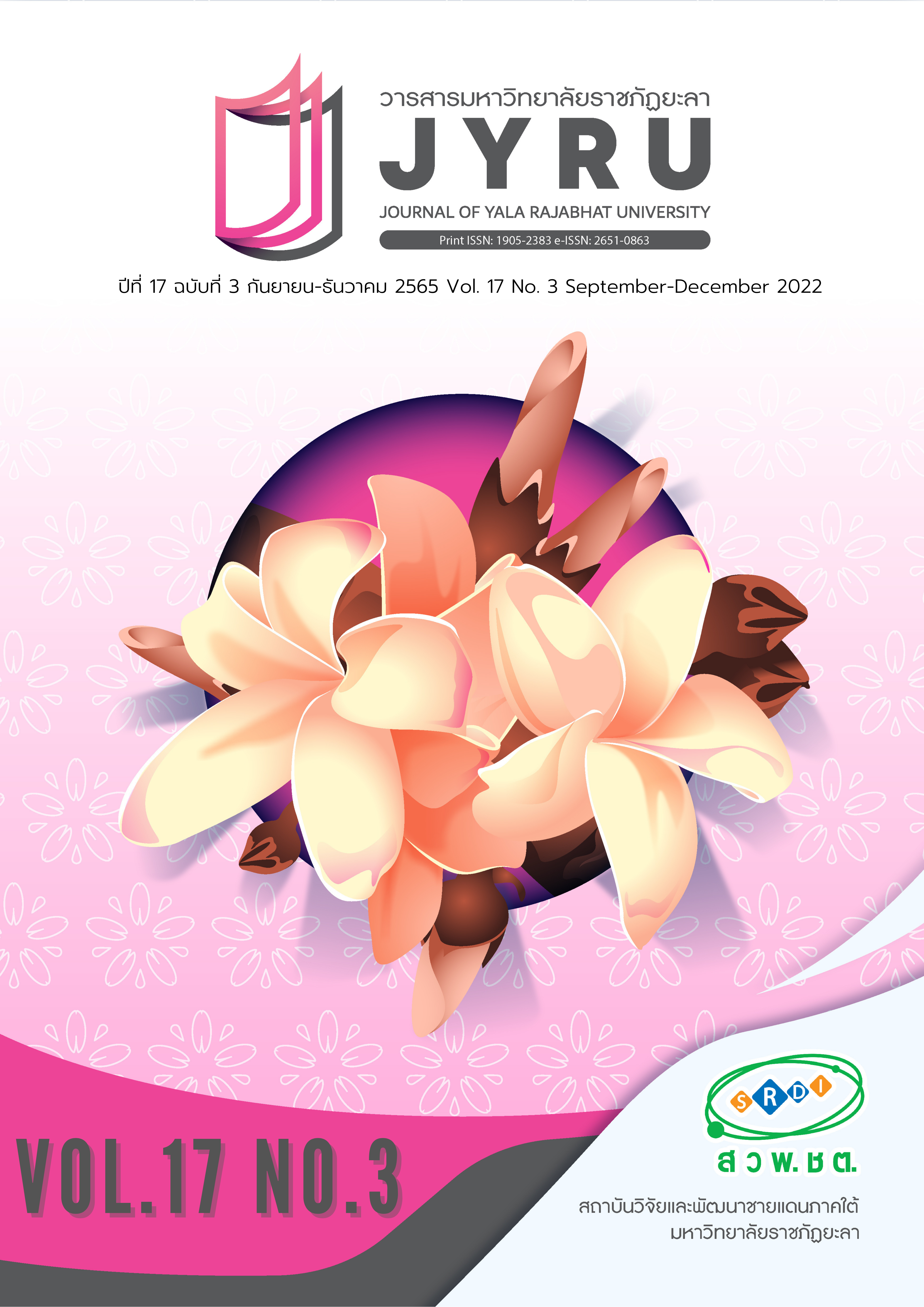การพัฒนารูปแบบการเรียนออนไลน์แบบสร้างความสัมพันธ์ตามแนวคิดเกมมิฟิเคชันเพื่อเสริมสร้างแรงจูงใจใฝ่สัมฤทธิ์และทักษะการทำงานเป็นทีมในการเขียนโปรแกรมของนักศึกษาระดับปริญญาตรี มหาวิทยาลัยราชภัฏ
Main Article Content
บทคัดย่อ
การเรียนเขียนโปรแกรมออนไลน์ ควรต้องมีรูปแบบที่เหมาะสม จึงวิจัยโดยมีวัตถุประสงค์เพื่อพัฒนารูปแบบการเรียนออนไลน์แบบสร้างความสัมพันธ์ตามแนวคิดเกมมิฟิเคชันเพื่อเสริมสร้างแรงจูงใจใฝ่สัมฤทธิ์และทักษะการทำงานเป็นทีมในการเขียนโปรแกรม กลุ่มตัวอย่างคือ นักศึกษาระดับปริญญาตรี ปีที่ 3 ที่ลงทะเบียนวิชาการเขียนโปรแกรมภาษาคอมพิวเตอร์ มหาวิทยาลัยราชภัฏหมู่บ้านจอมบึง จำนวน 20 คน ซึ่งได้มาจากการสุ่มอย่างง่าย สถิติที่ใช้ในการวิเคราะห์ข้อมูลได้แก่ ค่าร้อยละ ค่าเฉลี่ย ส่วนเบี่ยงเบนมาตรฐาน ทดสอบสมมติฐานด้วย t-test ผลการวิจัย พบว่า รูปแบบการเรียนออนไลน์ ประกอบด้วย 1) ขั้นเตรียมความพร้อม 2) ขั้นดำเนินการ 3) ขั้นผลิตและพัฒนา 4) ขั้นควบคุมระบบ 5) ขั้นประเมินผล แนวคิดเกมมิฟิเคชัน ประกอบด้วย 1) กติกา 2) การแข่งขัน 3) เวลา 4) ระดับ 5) ความร่วมมือ 6) รางวัลเหรียญตรา 7) ผลสะท้อนกลับ การเรียนออนไลน์แบบสร้างความสัมพันธ์ ประกอบด้วย 1) ความสัมพันธ์ทางพฤติกรรม 2) ความสัมพันธ์ทางอารมณ์ 3) ความสัมพันธ์ทางปัญญา ทักษะการทำงานเป็นทีม ประกอบด้วย 1) การร่วมกำหนดเป้าหมาย และแบ่งหน้าที่กันทำงาน 2) การตระหนักถึงบทบาทหน้าที่ของตน 3) การมีปฏิสัมพันธ์ที่ดีพึ่งพาอาศัยและช่วยเหลือกัน 4) รักษาบรรยากาศในการทำงานและปรับตัวหากัน 5) การสื่อสาร มีการปรึกษาและแก้ไขปัญหาร่วมกัน แรงจูงใจใฝ่สัมฤทธิ์ประกอบด้วย 1) ด้านการทำงาน ท้าทายความสามารถ 2) ด้านความพยายาม 3) ด้านความอดทน 4) ด้านผลสัมฤทธิ์ ผลการทดลอง พบว่า ผู้เรียนมีแรงจูงใจใฝ่สัมฤทธิ์และทักษะการทำงานเป็นทีม หลังเรียนสูงกว่าก่อนเรียนอย่างมีนัยสำคัญทางสถิติที่ระดับ .05 แสดงให้เห็นว่าใช้รูปแบบการเรียนออนไลน์ช่วยเสริมสร้างแรงจูงใจใฝ่สัมฤทธิ์ และเสริมสร้างทักษะการทำงานเป็นทีมให้เพิ่มขึ้นได้
Article Details

อนุญาตภายใต้เงื่อนไข Creative Commons Attribution-NonCommercial-NoDerivatives 4.0 International License.
บทความ ข้อมูล เนื้อหา รูปภาพ ฯลฯ ที่ได้รับการเผยแพร่ในวารสารมหาวิทยาลัยราชภัฏยะลานี้ ถือเป็นลิขสิทธิ์ของวารสารมหาวิทยาลัยราชภัฏยะลา หากบุคคลหรือหน่วยงานใดต้องการนำทั้งหมดหรือส่วนหนึ่งส่วนใดไปเผยแพร่ต่อหรือกระทำการใดๆ จะต้องได้รับอนุญาตเป็นลายลักษณ์อักษรจากวารสารมหาวิทยาลัยราชภัฏยะลาก่อนเท่านั้น
เอกสารอ้างอิง
Deterding, S., Dixon, D., Khaled, R., & Nacke, L. (2011). From game design elements to gamefulness: defining gamification. In Proceedings of the 15th International Academic MindTrek Conference: Envisioning Future Media Environments (MindTrek ’11), 1 Jan 2011.New York: ACM.
Domínguez, A., Saenz-de-Navarrete, J., De-Marcos, L., Fernández-Sanz, L., Pagés, C., & Martínez-Herráiz, J.-J. (2013). Gamifying learning experiences: Practical implications and outcomes. Computers & Education, 63, 380-392.
Fernandes, J., Duarte, D., Ribeiro, C., & Farinha, C., (2012). iThink: a game-based approach towards improving collaboration and participation in requirement elicitation. In Procedia Computer Science. 1 Jan 2012.New York: Elsevier
Hakulinen, L., & Auvinen, T. (2014). The effect of gamification on students with different achievement goal orientations. In Paper presented at the Teaching and Learning in Computing and Engineering (LaTiCE), 2014 International Conference on. 11-13 April 2014. Kuching, Malaysia: IEEE.
Hainey, T., Connolly, T., Stansfield, M., & Boyle, E. (2011). The differences in motivations of online game players and offline game players: A combined analysis of three studies at higher education level. Computers & Education, 57(4), 2197-2211.
Kapp, K. M. (2012). The gamification of learning and iInstruction: game-based methods and strategies for training and education. San Francisco: John Wiley & Sons.
Khammanee, T. (2010). Knowledge teaching for organizing effective learning processes (13 ed.). Bangkok: Chulalongkorn University printing. (in Thai)
Office for National Education Standards and Quality Assessment (Public Organization). (2014). Basic external quality assessment report 2006 – 2010. [Online]. Retrieved November 22, 2018, From: http://www.onesqa.or.th. (in Thai)
Office of the National Economic and Social Development Council. (2017) National Economic and Social Development Plan No. 12 (2017 - 2021) [Online]. Retrieved december 12, 2018, From: https://www.nesdc.go.th. (in Thai)
Pelling, N., (2011). The (short) prehistory of “gamification” Funding Startups (& other impossibilities). [Online]. Retritved September 16, 2020, form: https://nanodome.wordpress.com/2011/08/09/the-short-prehistory-of-gamification/
Schoech, D., Boyas, J. F., Black, B. M., & Elias-Lambert, N. (2013). Gamification for behavior change: Lessons from developing a social, multiuser, web-tablet based prevention game for youths. Journal of Technology in Human Services, 31(3), 197-217.
Wang, H., & Sun, C.-T. (2011). Game reward systems: gaming experiences and social meanings. In Paper presented at the Proceedings of DiGRA 2011 Conference:Think Design Play, 14-17 September 2011, Hilversum, Netherlands: Scientific Research Publishing.


